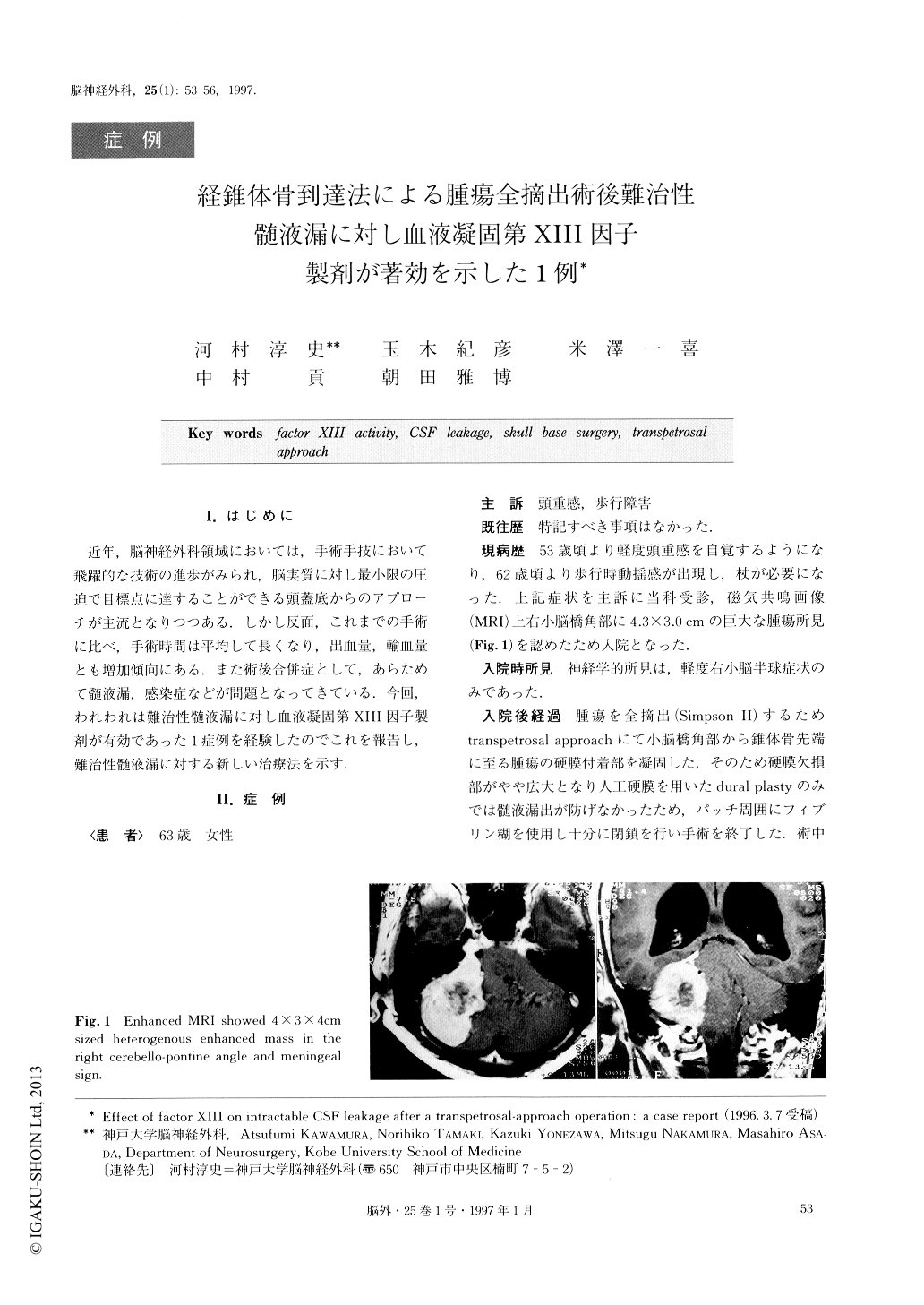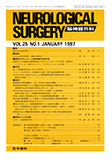Japanese
English
- 有料閲覧
- Abstract 文献概要
- 1ページ目 Look Inside
I.はじめに
近年,脳神経外科領域においては,手術手技において飛躍的な技術の進歩がみられ,脳実質に対し最小限の圧迫で目標点に達することができる頭蓋底からのアプローチが主流となりつつある.しかし反面,これまでの手術に比べ,手術時間は平均して長くなり,出血量,輸血量とも増加傾向にある.また術後合併症として,あらためて髄液漏.感染症などが問題となってきている.今回,われわれは難治性髄液漏に対し血液凝固第XⅢ因子製剤が有効であった1症例を経験したのでこれを報告し,難治性髄液漏に対する新しい治療法を示す.
The authors reported an experience showing that the XⅢ factor was effective for intractable cerebrospinal fluid (CSF) leakage after a transpetrosal operation to deal with cerebellopontine angle meningioma. A 63-year-old female noted a slight headache and a floating feeling. She became dependent on a stick for walking alone because of gradual gait disturbance. As the headache became more severe, she consulted the outpa-tient clinic of the department of neurosurgery of Kobe University Hospital. Magnetic resonance images (MRI) revealed a 4.3×3.0cm sized right cerebellopontine angle tumor. She was admitted for the purpose of re-moval of the tumor and preoperative examinations were performed. Neurological findings on admission showed only slight right cerebellar signs. The operation was performed via the transpetrosal approach and the tumor was totally removed (Simpson Grade Ⅱ). It took 12 hours 40 minutues for the operation. The amount of blood loss was 1970ml and the blood transfusion volume was 1200ml. Postoperative course was unevent-ful and her complaints disappeared. There were no postoperative complications at all, but 2 weeks after the operation, CSF leakage under the skin flap appeared. As subcutaneous fluid collection after skull base surgery is usual, spinal drainage and compression of the skin flap was carried out but these measures were not effective. The collection of fluid did not disappearfor 2 weeks. Based on our successful experience with the XⅢ factor therapy in intractable cerebrospinal fluid leakage from the nose after a transsphenoidal approach operation for recurrent pituitary adenoma, the blood level of the XⅢ factor activity was examined. As the result was far below the normal limit in this case, the XⅢ factor was infused at a rate of 750 units per day for 5 days. One week after the administration, the level of the XⅢ factor became normal. Fluid col-lection disappeared and the drainage tube was re-moved.
Recently, in neurosurgery, skull base surgery has been used widely and the range of craniotomy has been extended because operations can now be performedwithout compression of cerebral cortexes. However, op-eration time has increased and the volumes of bleeding and of blood transfusion are increasing. Postoperative complications such as CSF leakage and infection have become new problems. In this case, the XⅢ factor was still far below the normal level 2 weeks after the opera-tion and it could be considered to have caused delayed CSF leakage. Some papers have reported that the XⅢ factor was effective in treating intractable fistula after operations in other surgical areas. However, this is the first report of skull base surgery such as an operation using transpetrosal approach taking advantage of the effect of the XⅢ factor.

Copyright © 1997, Igaku-Shoin Ltd. All rights reserved.


